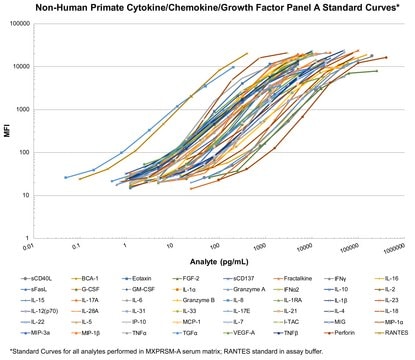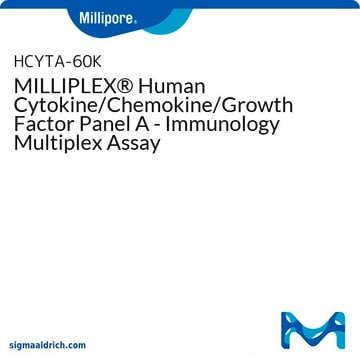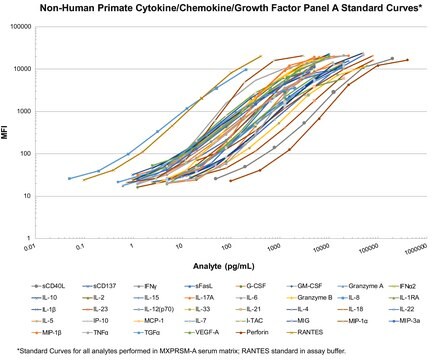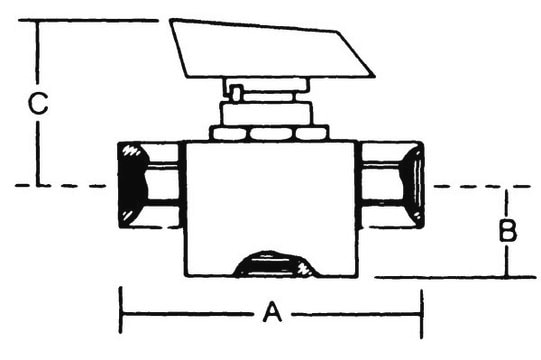PRCYTOMAG-40K
MILLIPLEX® Non-Human Primate Cytokine Magnetic Bead Panel - Immunology Multiplex Assay
Simultaneously analyze multiple cytokine and chemokine biomarkers with Bead-Based Multiplex Assays using the Luminex technology, in mouse serum, plasma and cell culture samples.
Synonym(s):
Luminex® non-human primate cytokine immunoassay, Millipore non-human primate cytokine panel, Monkey cytokine multiplex kit
About This Item
Recommended Products
Quality Level
species reactivity
nonhuman primates
manufacturer/tradename
Milliplex®
assay range
accuracy: 70-101%
standard curve range: 12.2-50,000 pg/mL
(IL-10, IL-18)
standard curve range: 2.4-10,000 pg/mL
standard curve range: 4.9-20,000 pg/mL
(IL-4)
technique(s)
multiplexing: suitable
detection method
fluorometric (Luminex xMAP)
shipped in
ambient
General description
The MILLIPLEX® Non-Human Primate Cytokine panel is to be used for the simultaneous quantification of any or all of the following in tissue/cell lysate and culture supernatant samples and serum or plasma samples: G-CSF, GM-CSF, IFNγ, IL-1β, IL-1ra, IL-2, IL-4, IL-5, IL-6, IL8, IL-10, IL-12/23(p40), IL-13, IL-15, IL-17A, MCP-1, MIP-1β, MIP-1α, sD40L, TGF-α, TNF-α, VEGF, and IL-18.
The Luminex® xMAP® platform uses a magnetic bead immunoassay format for ideal speed and sensitivity to quantitate multiple analytes simultaneously, dramatically improving productivity while conserving valuable sample volume.
Panel Type: Cytokines/Chemokines
Specificity
The multiplexed assay panel has been tested with samples from multiple non-human
primate species, please see protocol for details.
Application
- Analytes: G-CSF, GM-CSF, IFN-γ, IL-1RA, IL-1β, IL-2, IL-4, IL-5, IL-6, IL-8, IL-10, IL-12/23 (p40), IL-13, IL-15, IL-17, IL-18, MCP-1, MIP-1α, MIP-1β, sCD40L, TGF-α, TNF-α, VEGF
- Recommended Sample type: Serum, plasma, and cell culture
- Recommended Sample dilution: Neat
- Assay Run Time: Overnight or one day. For best results, an overnight incubation is recommended
- Research Category: Inflammation & Immunology
Features and Benefits
Packaging
Storage and Stability
Other Notes
Standard Curve Range: Refer to QC analysis sheet for exact concentration (sCD40L, TNFα)
Legal Information
Disclaimer
Signal Word
Danger
Hazard Statements
Precautionary Statements
Hazard Classifications
Acute Tox. 4 Dermal - Acute Tox. 4 Inhalation - Acute Tox. 4 Oral - Aquatic Chronic 2 - Eye Dam. 1 - Skin Sens. 1 - STOT RE 2
Target Organs
Respiratory Tract
Storage Class Code
10 - Combustible liquids
Certificates of Analysis (COA)
Search for Certificates of Analysis (COA) by entering the products Lot/Batch Number. Lot and Batch Numbers can be found on a product’s label following the words ‘Lot’ or ‘Batch’.
Already Own This Product?
Find documentation for the products that you have recently purchased in the Document Library.
Our team of scientists has experience in all areas of research including Life Science, Material Science, Chemical Synthesis, Chromatography, Analytical and many others.
Contact Technical Service












